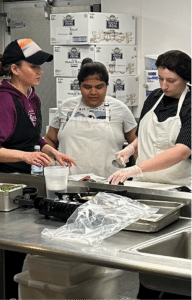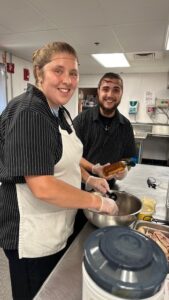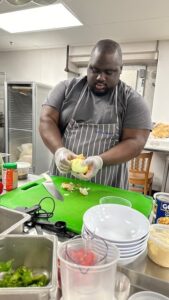What happens to the millions of young adults with disabilities who are eager to work but face barriers at every turn? In the 2021-2022 school year alone, 7.5 million students in the U.S. had disabilities, but far too many continue to lack the opportunities they need to transition into the workforce. With an unemployment rate of 65.8% for people with disabilities, the need for targeted programs is urgent. One program making a tangible difference in Massachusetts is Employment Options, based in Marlborough. Through hands-on training and industry certifications, they help young adults not just find jobs but gain independence, purpose, and hope for their future.
With the support of a $175,000 grant through the Executive Office of Labor and Workforce Development’s Employment Program for Young Adults with Disabilities (administered by Commonwealth Corporation), Employment Options has been empowering young adults with diagnosed disabilities on their path to employment. In a landscape where people without disabilities are three times more likely to be employed than those with disabilities, programs like Employment Options are essential. Currently serving 30 participants in its most recent cohort, the program supports young adults through hands-on culinary training and certification.
Shannon Leary, Program Director at Employment Options, shares that their culinary training is a seven-week intensive program, combining both educational components and hands-on experience in a commercial kitchen. Participants work closely with Quinsigamond Community College to earn multiple certifications, such as SERV Safe, FEAST, and Allergen Certificates, along with college credits. “The amazing part is that when folks do graduate, we have multiple employment partners both in the Metro West area as well as now the North County area who are now ready, able, and willing to hire our young adults because they are now coming with certificates, some hard skills trainings, and some soft skills training as well,” she notes. Employment Options has built strong partnerships with businesses like Nothing Bundt Cakes and UMASS Medical School, ensuring that participants are not only trained but also well-prepared for employment opportunities.
The impact of this program goes beyond the skills and certificates that the young adults receive. Shannon acknowledges that the program “has helped folks with independence and autonomy, knowing that our young adults have financial independence, and it’s allowing them to make their own choices. A lot of our young adults talk about going through this training and obtaining a job has helped contribute to a sense of purpose and self-worth; it boosts their mental health and overall well-being.”
Shannon shares a powerful story that highlights the profound impact of the program. One young adult, who initially faced challenges with mental health and felt a lack of direction, underwent an incredible transformation after joining. “After months of engagement, they became one of the first graduates of the Commonwealth Corporation grant, went on to management training, and even won multiple awards from their employers,” Shannon said. Their mother continues to express her gratitude, calling the program “life-changing for both their child and the family. Year after year, we hear from moms and dads, aunts, uncles, and employers, saying how much the program has made a difference to the young adults,” shares Shannon.
“We really talk about job readiness, but also career exploration,” says Shannon, emphasizing Employment Options’ commitment to supporting young adults not only during the program but also after its completion. “It’s really important for folks to go back to work and have a job but also how do they maintain and keep that job, so looking at the future and looking at what the next steps are, this particular grant has really helped.”
The Clubhouse Program at Employment Options, described by Shannon as “an international model that supports adults with mental health conditions,” allows Employment Options to “enroll and follow individuals through their personal and professional joruneys—the statement is once a member, always a member.” Shannon adds, “This is helpful to the participant because we can offer support after graduation for as long as they need.”
This program is a leader in recognizing the vital need for programs that serve young adults with disabilities. “Families and young adults with disabilities need services and programs like ours and those offered by other nonprofits, especially during this critical time,” says Shannon. She emphasizes that the program not only fosters social change and community engagement but also strengthens economic recovery. “We feel like we offer an opportunity to help stimulate the local economy by placing qualified young adults into positions, especially in hospitality and culinary industries hit hard by the pandemic.”
Employment Options is not just a job training program—it’s a lifeline for young adults with disabilities. “It provides meaning, purpose, and a sense of community,” says Shannon. Programs like these are crucial, especially as families and young adults continue to face barriers in transitioning to employment. With continued funding and support, Employment Options can continue fostering social change and strengthening community ties. It also plays a key role in stimulating the local economy by placing qualified young adults into the workforce—especially in industries still recovering from the pandemic.
About Employment Program for Young Adults with Disabilities
残疾青年就业计划, administered by Commonwealth Corporation on behalf of the Executive Office of Labor and Workforce Development (EOLWD), is part of the Healey-Driscoll Administration’s commitment to building a diverse and skilled workforce for Massachusetts employers.
This grant program invites applications from community-based organizations with a proven track record in preparing young adults with disabilities for employment. Successful initiatives will focus on job placement and post-placement support to promote retention.
A Request for Proposals (RFP) is now available! Click here for more information about this funding opportunity.
October is National Disability Employment Awareness Month (NDEAM)



